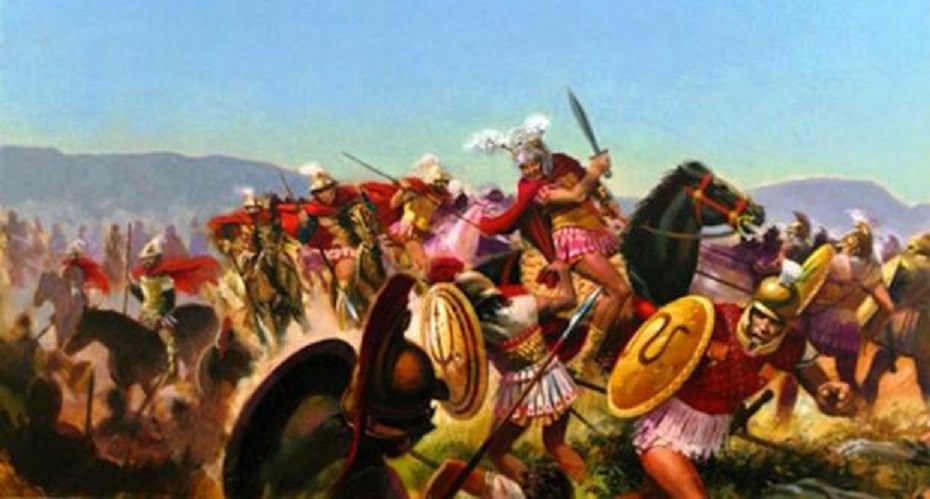Battle of Chaeronea
Philip II of Macedon's Decisive Victory Over Greece
The greatest victory of Philip II of Macedonia, the battle of Chaeronea, solidified Macedonian rule in Greece. This clash between the Greek city-states alliance of Athen and Thebes against the Basileus of Macedon forever changed the history of the ancient world.
Rising to major power
On his succession to the throne in 359 B.C., Philip II Macedon's first action was to improve the military and political strength of Macedonia. He rebuilt the Macedonian army from the core, improving not only its method of training but also armor, tactics and weapons, changing the phalanx into hoplites armed with sarissas and xiphos. Once he dealt with the inner turmoil of his country, the next step was expansion.
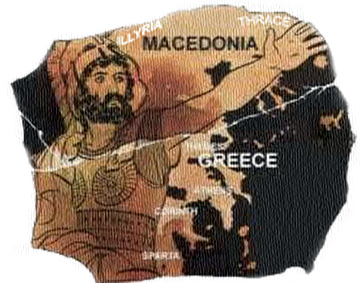
The king of Macedonia quickly raised as a formidable force, adding to his kingdom the lands of Thrace, through Chalkidiki and all the way to the Aegean sea. Philip methodically eradicated numerous coastal cities in the Balkans, successfully leading battle after battle and increasing his prestige. His actions after the Sacred War were extremely offensive to Athens, who could not do anything at the time. Philip took cities one after another and Athens had to sit silently and watch as the Macedonian king increased his power and influence. Soon, he was also granted a seat on the mighty Amphicroyonic Council, a powerful political and religious league of neighbours which was already, in Philip's time, very ancient.
The Alliance of the Greek city-states
The rising power from the north, Philip II, was not to the liking of Athens and Thebes, who formed an alliance against their mutual foe. Thebes first chose to unite with the Persian empire, who were displeased by the weight of Philip's power in Anatolia. In the end, in 340, the war was inevitable. The last straw for the Athenians was when the Macedonian king captured one of the food convoys headed to the city. At the time, he was besieging Perinthus. An immediate response from the Greek cities was the declaration of war.
The Blockade
Athens and Thebes started capturing Philip's port cities. Athens' first line of defense was the mountain passes, which led to inner Greece, leaving the Macedonian with no choice but to retreat for the time being. Those who guarded the passes soon grew restless with the constant maneuvering. Not long after they were deceived with a rumor that Philip was finally withdrawing and they lowered their guard.
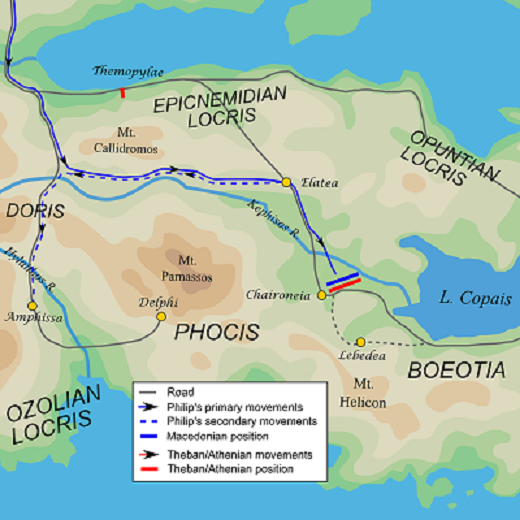
That was exactly what the Macedonian king had been waiting for. Under the cover of night, Philip and his men got rid of the defenders and occupied the city of Amphissa, which lay beyond. After that, they moved on to the next - Naupaetus - and captured it as well. Philip II offered the greeks an end to the war, but they refused his offer of peace. Philip and his son Alexander continued their conquest and took over the city of Elateia.
Their route to Thebes was now open, and Athens was next. There was no stopping them, a historical clash was soon to reveal the future of the ancient cities. Just south of the Boeotian border was the town of Chaeronea. As Philip, his son and his army marched down their route, they reached some small plains just outside the town.
The Battle of Chaeronea - August 2, 338 B.C.
And there was their enemy - Thebans, Athenians, and the rest of the allies from the Boeotian Federation. The right cavalry wing and right infantry center were made up of the Thebans while the Athenians had taken the left cavalry ring and left infantry center. Their forces consisted of as many as 1400 cavalry and 22,000 infantry, and the invincible Sacred Band of Thebes, around 300 men. The allies were in the vanguard, also reaching several thousand infantry.
The Macedon deployed his forces on the right, facing the Athenians with 30,000 infantry in the middle and up to 3,000 cavalry units on the wing, giving the command of the Companion Cavalry to his son Alexander, who positioned himself on the left across from the Thebans.
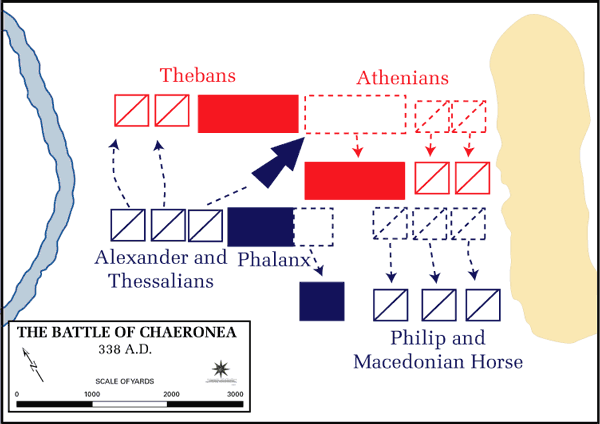
The Athenians waited no more. They launched their attack and to their surprise, Philip started withdrawing. It was already too late when the Athenians realized it was a trap and they walked right into it. The Macedonian King lured them right in between his forces and charged right through their center, breaking their lines and dealing them a devastating blow.
The allies of Athens and Thebes did not even bother to step in to help. Instead, they fled, knowing they stood no chance. On the left side of the battlefield, Alexander destroyed the line of charging troops and completely crushed them, using the opening his father made for him.
The Macedonian phalanx and Alexander with his Companion cavalry then attacked and massacred possibly the entire elite infantry unit known as the Sacred Band. When the fight ended, over a thousand dead Greeks lay on the ground and up to four thousand of their brothers were captured and later sold into slavery.
Aftermath
There was no force that could stop Philip on his conquest and the war was effectively over with this single total defeat over the Greek cities. Athens had no choice but to obey their new king and became allies of their former enemy. Philip made good use of them for their strategic position and their large fleet, so he let them keep their colony on Samos and let the captured Athenians go free. The Thebans were not so lucky, they lost lands, had to pay the ransom for the prisoners and Philip expelled their leaders.
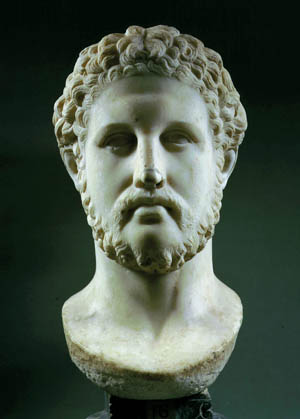
Conclusion
The battle of Chaeronea was the decisive clash that let Philip not only establish hegemony over almost the whole of Greece but allowed him to continue his campaign to the East. His long-held wish to conquer the Persian Empire was now possible. Unfortunately for the Macedonian king, his untimely assassination did not let him lead the Conquest on his own, yet his son continued on the path and came to be known as Alexander The Great.
Source
[1] "War History Online" by Yulia Dzhak


